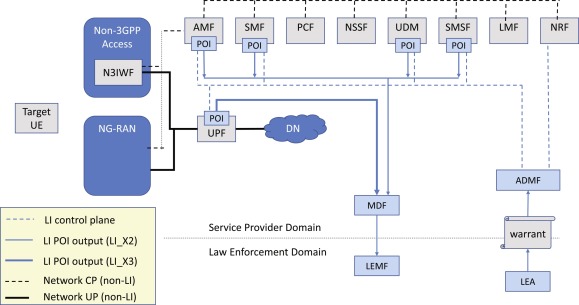Lawful Interception: Benefits, Challenges, and Oversight Mechanisms
Lawful interception (LI) is a critical tool employed by law enforcement and intelligence agencies worldwide to monitor and intercept telecommunications legally. This process enables the surveillance of electronic communications, such as phone calls and internet data transmissions, under judicial or administrative authorization. Telecommunications providers, including mobile network operators and internet service providers, are mandated to support these surveillance activities, ensuring that they are compliant with established international standards and regulations. Lawful interception plays a pivotal role in combating crime and terrorism, safeguarding national security, and enhancing public safety.

What is Lawful Interception?
Lawful interception (LI) is the legally authorized surveillance of telecommunication services by law enforcement agencies. This process involves monitoring electronic communications, such as phone and data transmissions, as permitted by judicial or administrative orders. Telecommunications providers, including mobile network operators, equipment vendors, and internet service providers, are required to support these surveillance activities.
The interception is typically targeted at specific users without their knowledge. International standards and regulations have been established to ensure that communication networks are designed to facilitate authorized electronic surveillance while complying with legal requirements. It has become an important tool for law enforcement and intelligence agencies worldwide to investigate crime and terrorism.
Lawful Interception in Various Telecommunications Eras
Telegraph Era
Telecommunication technologies emerged in the 1840s, with one of the earliest recorded instances of telegraphic interception occurring in 1867. A Wall Street stockbroker conspired with Western Union telegraph operators to intercept telegraphic dispatches intended for Eastern newspapers. These intercepted messages were then replaced with false reports of financial disasters affecting companies on the New York Stock Exchange. This manipulation drove down share prices, allowing the conspirators to purchase the devalued stocks at a profit.
Telephone Era
With the invention and proliferation of the telephone, interception methods evolved. In the early days, this involved physically tapping telephone lines. By the 1960s, telephone surveillance had become more accessible and commercialized, as evidenced by advertisements promoting devices like the "Tel-O-Record" that allowed for easy eavesdropping on phone conversations.
Digital Network Era
The 1990s brought a significant shift with the large-scale conversion of telecommunications to digital formats and the rise of internet platforms. This transformation posed new challenges for law enforcement agencies, prompting substantial legislative changes, standards development, and technological innovations across the globe. Lawful interception adapted to these advancements, incorporating digital switches and internet-based necessitated close cooperation between governments, standards organizations, and telecommunication providers to ensure that lawful interception capabilities remained effective and legally compliant.

Advantages of Lawful Interception for Governments
Preventing and Solving Crimes
Lawful interception is crucial for preventing and solving criminal activities, such as terrorism, drug trafficking, cybercrime, and organized crime. Governments can identify and apprehend criminals by accessing communication data, which is often instrumental in tracking criminal networks and their operations.
Ensuring National Security
Lawful interception helps safeguard national security by detecting and thwarting terrorist plots, espionage, and other threats. Monitoring communications allows governments to act swiftly against potential dangers to the country’s safety.
Enhancing Public Safety
Lawful interception aids in locating missing persons, tracking potential threats, and responding to emergencies. For instance, it can be invaluable in cases of child abduction or human trafficking, enabling authorities to act quickly and effectively.
Supporting Legal Processes
Intercepted communication data serves as crucial evidence in legal proceedings. It helps establish the guilt or innocence of suspects, supports investigations, and contributes to a fair legal system by providing concrete proof in court.
Gathering Intelligence
Beyond crime prevention, lawful interception allows governments to gather intelligence on various activities, both domestically and internationally. This intelligence is vital for making informed decisions on security and policy matters.
Improving Regulatory Compliance
Telecommunication providers are often required to comply with lawful interception mandates, ensuring they operate within legal frameworks. This compliance helps maintain the integrity and reliability of communication networks.
Challenges and Concerns of Lawful Interception
While lawful interception is crucial for preventing illegal activities, it is also accompanied by several concerns and challenges. These challenges include:
Privacy Issues
One of the most significant concerns is the potential violation of privacy rights. Intercepting private communications without consent can infringe upon individuals' right to privacy, raising ethical and legal issues.
Technological Barriers
The rise of advanced encryption and communication technologies can make it difficult to intercept communications effectively. For instance, end-to-end encryption can prevent government agencies from accessing the content of messages, limiting the effectiveness of lawful interception.
Data Security Risks
Storing and managing intercepted data involves significant security risks. Unauthorized access or data breaches can expose sensitive information to malicious actors, undermining the effectiveness of lawful interception efforts.
Resource Demands
Implementing and maintaining lawful interception capabilities require substantial investments in technology and manpower. This can strain government resources and budgets, potentially diverting funds from other critical areas.
Ethical and Legal Oversight
To mitigate the concerns and limitations, robust safeguards and oversight mechanisms are necessary. This includes judicial oversight, strict legal requirements, and transparency measures to balance the need for security with individual rights and freedoms. Ensuring that lawful interception is conducted ethically and within legal boundaries is crucial for maintaining public trust.
Comprehensive Oversight Mechanisms for Lawful Interception
Effective oversight mechanisms are essential to ensure that lawful interception activities are conducted ethically and within legal boundaries. These mechanisms include stringent judicial oversight, whereby interception requests must be reviewed and approved by a court or relevant legal authority. This process helps safeguard against unauthorized or excessive surveillance. Additionally, independent oversight bodies can be established to monitor interception practices, ensuring compliance with legal standards and protecting citizens' rights. Regular audits and transparency reports can further enhance accountability, providing the public with insights into the scope and nature of interception activities. By implementing robust oversight frameworks, governments can balance national security needs with the protection of individual privacy and civil liberties.
Conclusion
Lawful interception remains an indispensable component of modern law enforcement and national security strategies. While it offers substantial benefits in crime prevention, national security, and public safety, it also presents significant challenges and concerns, particularly regarding privacy, data security, and resource allocation. By establishing comprehensive oversight mechanisms and adhering to strict legal and ethical standards, governments can effectively balance the imperative of security with the protection of individual rights. As communication technologies continue to evolve, so too must the frameworks governing lawful interception to ensure they remain relevant and effective.